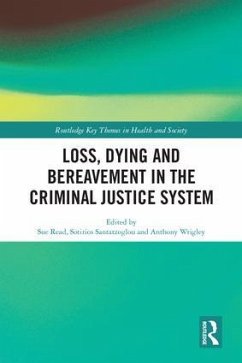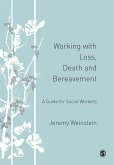Loss, Dying and Bereavement in the Criminal Justice System
Herausgeber: Read, Sue; Wrigley, Anthony; Santatzoglou, Sotirios
Loss, Dying and Bereavement in the Criminal Justice System
Herausgeber: Read, Sue; Wrigley, Anthony; Santatzoglou, Sotirios
- Gebundenes Buch
- Merkliste
- Auf die Merkliste
- Bewerten Bewerten
- Teilen
- Produkt teilen
- Produkterinnerung
- Produkterinnerung
This volume explores crucial issues surrounding the impact of loss, death and dying for criminal offenders, for whom the bereavement process can be a complicated experience. The first section considers theoretical approaches to loss; the next section explores practical applications; and the final section introduces an offender perspective.
Andere Kunden interessierten sich auch für
![Loss, Dying and Bereavement in the Criminal Justice System Loss, Dying and Bereavement in the Criminal Justice System]() Loss, Dying and Bereavement in the Criminal Justice System53,99 €
Loss, Dying and Bereavement in the Criminal Justice System53,99 €![Working with Loss, Death and Bereavement Working with Loss, Death and Bereavement]() Jeremy A WeinsteinWorking with Loss, Death and Bereavement40,99 €
Jeremy A WeinsteinWorking with Loss, Death and Bereavement40,99 €![The Aesthetic Experience of Dying The Aesthetic Experience of Dying]() Veronica M. F. AdamsonThe Aesthetic Experience of Dying167,99 €
Veronica M. F. AdamsonThe Aesthetic Experience of Dying167,99 €![Bereavement Narratives Bereavement Narratives]() Christine ValentineBereavement Narratives169,99 €
Christine ValentineBereavement Narratives169,99 €![Sociology of Death and the American Indian Sociology of Death and the American Indian]() Gerry R. CoxSociology of Death and the American Indian44,99 €
Gerry R. CoxSociology of Death and the American Indian44,99 €![Funerary Practices in the Netherlands Funerary Practices in the Netherlands]() Brenda MathijssenFunerary Practices in the Netherlands63,99 €
Brenda MathijssenFunerary Practices in the Netherlands63,99 €![Sociology of Death and the American Indian Sociology of Death and the American Indian]() Gerry R. CoxSociology of Death and the American Indian131,99 €
Gerry R. CoxSociology of Death and the American Indian131,99 €-
-
-
This volume explores crucial issues surrounding the impact of loss, death and dying for criminal offenders, for whom the bereavement process can be a complicated experience. The first section considers theoretical approaches to loss; the next section explores practical applications; and the final section introduces an offender perspective.
Produktdetails
- Produktdetails
- Verlag: Routledge
- Seitenzahl: 220
- Erscheinungstermin: 5. April 2018
- Englisch
- Abmessung: 240mm x 161mm x 17mm
- Gewicht: 499g
- ISBN-13: 9781138283572
- ISBN-10: 1138283576
- Artikelnr.: 52456964
- Herstellerkennzeichnung
- Libri GmbH
- Europaallee 1
- 36244 Bad Hersfeld
- gpsr@libri.de
- Verlag: Routledge
- Seitenzahl: 220
- Erscheinungstermin: 5. April 2018
- Englisch
- Abmessung: 240mm x 161mm x 17mm
- Gewicht: 499g
- ISBN-13: 9781138283572
- ISBN-10: 1138283576
- Artikelnr.: 52456964
- Herstellerkennzeichnung
- Libri GmbH
- Europaallee 1
- 36244 Bad Hersfeld
- gpsr@libri.de
Sue Read of Professor of Learning Disability Nursing and Chair of the Palliative and End of Life Care Research Group at Keele University, UK. Sotirios Santatzoglou is Teaching Fellow in Law at Keele University, UK. Anthony Wrigley is Senior Lecturer in Ethics at Keele University's Centre for Professional Ethics, UK.
SECTION I: Appreciating dimensions of loss, death, dying and bereavement
1. Disenfranchised communities.
2. Death, dying and maintaining hope: ethical tensions and responsibilities
in the prison setting.
3. 'Sympathy to the offender': The Hobbesian account and the sympathy to
the offender as an issue in end of life care PART A.
4. Loss at the end of life: Palliative care in prisons.
5. Deaths in sites of state confinement: A continuum of routine violence
and terror.
6. Civil and social death: Criminalisation and the loss of the self.
SECTION II: Professional development of bereavement and end of life
practice.
7. Bereavement and loss at the sentencing stage.
8. Criminal justice context and voluntary bereavement support.
9. 'Sympathy to the offender': The Hobbesian account and the sympathy to
the offender as an issue in end of life care PART B.
10. Working in the shadows: Reflections on counselling in prison and
hospice settings.
11. The Evolution of Change: Factors involved in the design and delivery of
a therapeutic service within the confines of a custodial setting.
12. Offenders and the challenges of palliative care in the community
setting.
SECTION III: Insights to inform reflections for ongoing support
13. Sorrow, loss and the transition of chronic disease to end of life care
in prisons.
14. The impact of loss on mental health: Implications for practice.
15. Mourning in custody: Dealing with sudden death.
16. Freedom to grieve: a child and parent perspective.
17. Beyond loss of liberty: How loss, bereavement and grief can affect
young men's prison journeys.
18. Grief, chaplaincy and the non-religious prisoner.
1. Disenfranchised communities.
2. Death, dying and maintaining hope: ethical tensions and responsibilities
in the prison setting.
3. 'Sympathy to the offender': The Hobbesian account and the sympathy to
the offender as an issue in end of life care PART A.
4. Loss at the end of life: Palliative care in prisons.
5. Deaths in sites of state confinement: A continuum of routine violence
and terror.
6. Civil and social death: Criminalisation and the loss of the self.
SECTION II: Professional development of bereavement and end of life
practice.
7. Bereavement and loss at the sentencing stage.
8. Criminal justice context and voluntary bereavement support.
9. 'Sympathy to the offender': The Hobbesian account and the sympathy to
the offender as an issue in end of life care PART B.
10. Working in the shadows: Reflections on counselling in prison and
hospice settings.
11. The Evolution of Change: Factors involved in the design and delivery of
a therapeutic service within the confines of a custodial setting.
12. Offenders and the challenges of palliative care in the community
setting.
SECTION III: Insights to inform reflections for ongoing support
13. Sorrow, loss and the transition of chronic disease to end of life care
in prisons.
14. The impact of loss on mental health: Implications for practice.
15. Mourning in custody: Dealing with sudden death.
16. Freedom to grieve: a child and parent perspective.
17. Beyond loss of liberty: How loss, bereavement and grief can affect
young men's prison journeys.
18. Grief, chaplaincy and the non-religious prisoner.
SECTION I: Appreciating dimensions of loss, death, dying and bereavement
1. Disenfranchised communities.
2. Death, dying and maintaining hope: ethical tensions and responsibilities
in the prison setting.
3. 'Sympathy to the offender': The Hobbesian account and the sympathy to
the offender as an issue in end of life care PART A.
4. Loss at the end of life: Palliative care in prisons.
5. Deaths in sites of state confinement: A continuum of routine violence
and terror.
6. Civil and social death: Criminalisation and the loss of the self.
SECTION II: Professional development of bereavement and end of life
practice.
7. Bereavement and loss at the sentencing stage.
8. Criminal justice context and voluntary bereavement support.
9. 'Sympathy to the offender': The Hobbesian account and the sympathy to
the offender as an issue in end of life care PART B.
10. Working in the shadows: Reflections on counselling in prison and
hospice settings.
11. The Evolution of Change: Factors involved in the design and delivery of
a therapeutic service within the confines of a custodial setting.
12. Offenders and the challenges of palliative care in the community
setting.
SECTION III: Insights to inform reflections for ongoing support
13. Sorrow, loss and the transition of chronic disease to end of life care
in prisons.
14. The impact of loss on mental health: Implications for practice.
15. Mourning in custody: Dealing with sudden death.
16. Freedom to grieve: a child and parent perspective.
17. Beyond loss of liberty: How loss, bereavement and grief can affect
young men's prison journeys.
18. Grief, chaplaincy and the non-religious prisoner.
1. Disenfranchised communities.
2. Death, dying and maintaining hope: ethical tensions and responsibilities
in the prison setting.
3. 'Sympathy to the offender': The Hobbesian account and the sympathy to
the offender as an issue in end of life care PART A.
4. Loss at the end of life: Palliative care in prisons.
5. Deaths in sites of state confinement: A continuum of routine violence
and terror.
6. Civil and social death: Criminalisation and the loss of the self.
SECTION II: Professional development of bereavement and end of life
practice.
7. Bereavement and loss at the sentencing stage.
8. Criminal justice context and voluntary bereavement support.
9. 'Sympathy to the offender': The Hobbesian account and the sympathy to
the offender as an issue in end of life care PART B.
10. Working in the shadows: Reflections on counselling in prison and
hospice settings.
11. The Evolution of Change: Factors involved in the design and delivery of
a therapeutic service within the confines of a custodial setting.
12. Offenders and the challenges of palliative care in the community
setting.
SECTION III: Insights to inform reflections for ongoing support
13. Sorrow, loss and the transition of chronic disease to end of life care
in prisons.
14. The impact of loss on mental health: Implications for practice.
15. Mourning in custody: Dealing with sudden death.
16. Freedom to grieve: a child and parent perspective.
17. Beyond loss of liberty: How loss, bereavement and grief can affect
young men's prison journeys.
18. Grief, chaplaincy and the non-religious prisoner.









